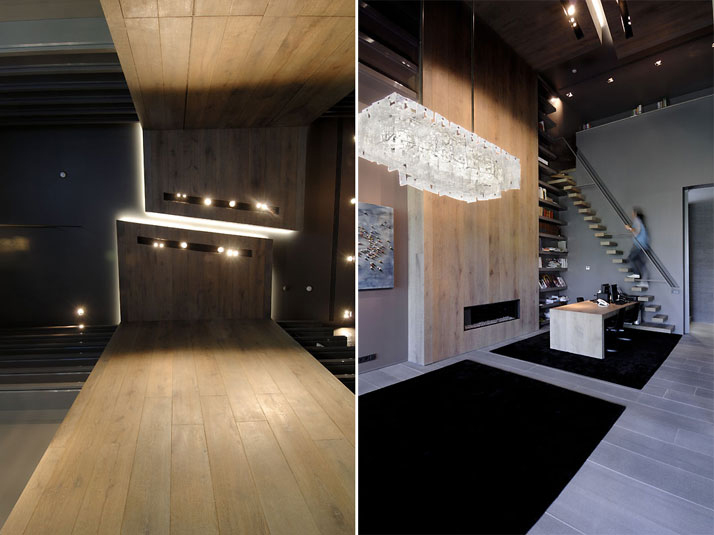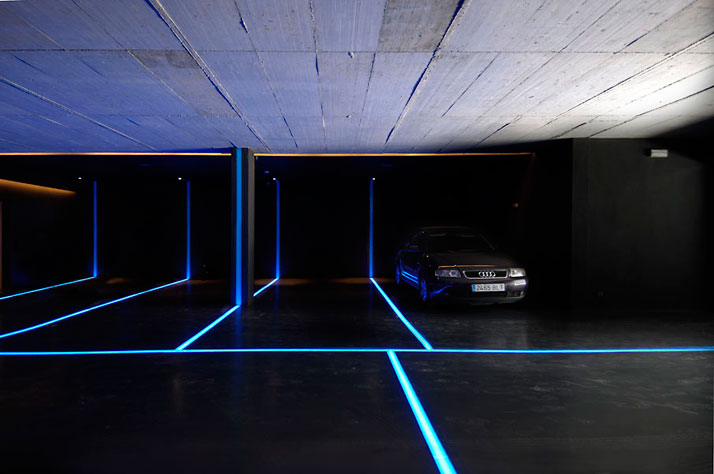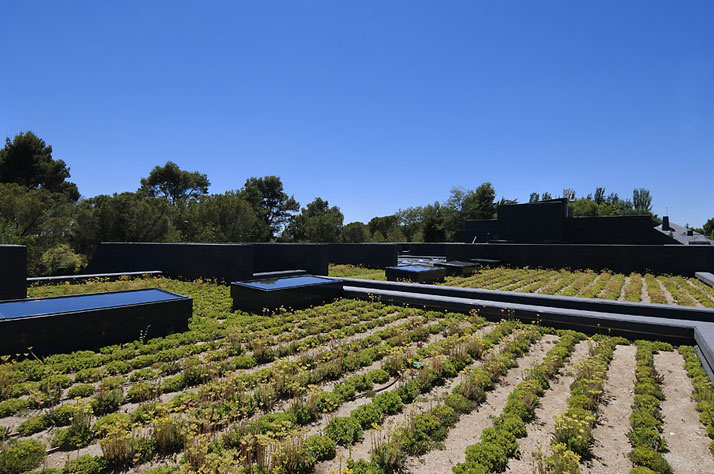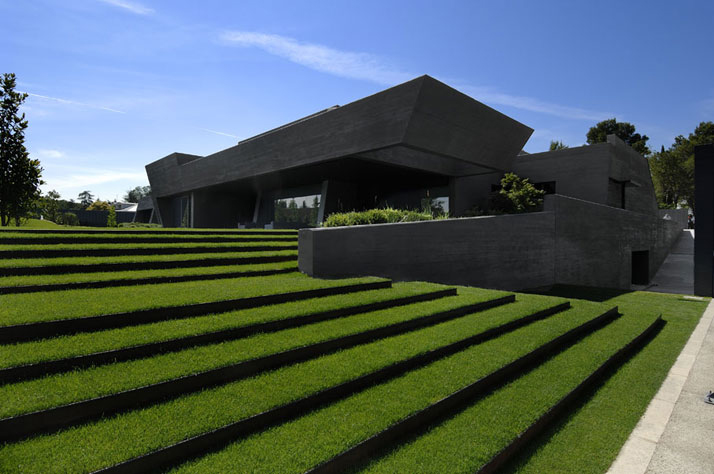First publised in Yatzer (February 3, 2011) by Marcia Argyriades..☛..In modern day architecture a growing number of houses are constructed of concrete, despite the quantity, to some concrete seems like an impersonal construction material which portrays an element of remoteness and coldness. Concrete House II by A-Cero Architectural Studio is here to persuade those hard to convince that a modern concrete residence can be a warm, welcoming residence with everything that every resident could ever dream of wanting. Concrete House II is a rather large house of 1,600 square meters, and is located in the outskirts of Madrid, Spain on a 5,000 square meter plot. The house is developed in a single storey and despite the fact that it has a large floor area, the single storey allows for a human scale residence. The first impression that the concrete residence generates is that the building seems to be hidden between concrete walls and a lush green ramp that extends to the roof of the residence. The anthracite painted cement walls with the lush foliage seem to scale in an upward manner towards the clear blue sky. The residence’s façade demonstrates the impressive unrefined view of the interiors so that even the ‘harsh’ concrete material shows it’s most warm and welcoming personality. The clean cut geometrical design of the exterior architectural planning is evident in the interiors as well from a glance into the house through the large façade windows. The exterior architectural landscaping of Concrete House II by A-Cero Architectural Studio is finely manicured. Within the 5,000 square meter plot certain sections of the lush vegetation surrounding the slopes slightly scale about half way up the concrete wall support. In other sections within the plot the grass slopes in an upward manner all the way to the roof of the home. Furthermore, apart from the grass, A-Cero Architectural Studio did not want to leave a bare lawn; scatterly planted young trees give the landscape an additional natural essence within the hefty plot. In addition a large pond and a fountain add the water element which compliments the architectural landscaping and creates a rather welcoming and hospitable environment.
The main entrance of the house seems as if it is the gateway to a medieval monument; what has mostly assisted in creating this feeling is the imposing cement construction as well as the grandeur and the up scaling exterior walls. The interiors of Concrete House II are all designed in an open plan layout with partial walled dividers between the twelve person dining room and the luxurious contemporary living area. The large kitchen in anthracite and zinc white tones features slightly unconventional angles and a center island stove with a modern angled black lacquered hood, as well as a large bar sitting area. The rooms at the back part of the house have been equally impressively design in grey and white tones. Large neutral looking rugs cover the concrete floors, while the color scheme on the walls matches the overall zinc white and grey toned color palette of the rest of the home. Furniture in grey, black and white is accented by colored art pieces and sculptures that add a unique touch to the overall design scheme. The living and dining room area is flooded by natural light through the large windows. Minimal and hidden artificial lighting adds a dramatic effect in the black and white living room and dining room area. Wood, inox, metal, and glass are the elements used to design the interior; the legendary and always in style Barcelona stools compliment the living room while a unique light box coffee table adds a warm touch.
All the elements within Concrete House II are carefully placed and considered. For all its lavishness and splendor, overall the interior are intimate and balanced in every consideration. The rear façade of the residence has entirely unobstructed views towards the garden where the lounge, dining room, library, study and bedrooms are. In this façade the wide windows and the volumes set the projections made of concrete as well as enhance the space. These elements are found throughout the numerous porches of the house. The large window of the main lounge conceals itself by design in order to make this stay completely opened to the exterior areas. Sustainable architectural design is of outmost importance in A-cero’s Concrete House II. The façade and the roof serve as the main ecological and sustainable roles as they are covered with low consume vegetation. Furthermore, the roof has been implemented with a renewable energy system made of wide surfaces with solar tubular collectors that allow for solar energy autonomy of the house. Overall, it is a unique residence with exterior and interior elements that have been carefully designed in order to keep a balance and soften the harshness of concrete as a material. Concrete House II by A-cero gives the impression of an intimate and poised house in every aspect.
Source: Yatzer

















